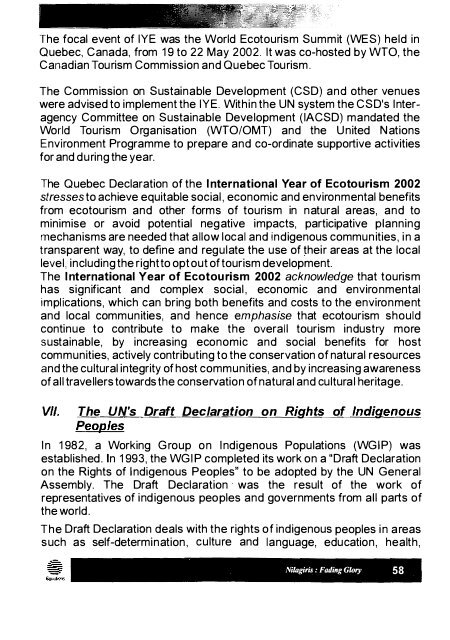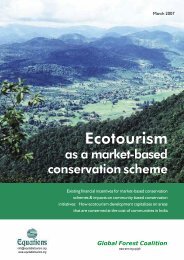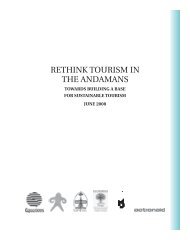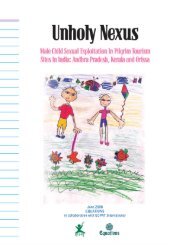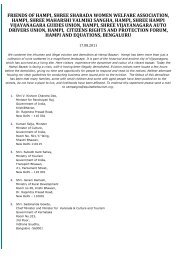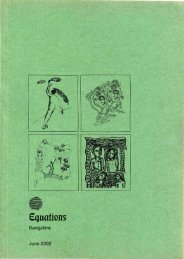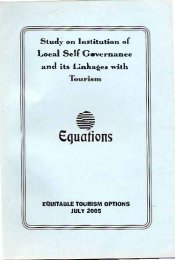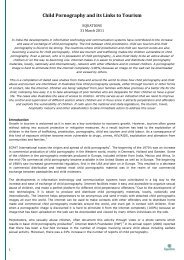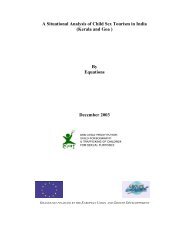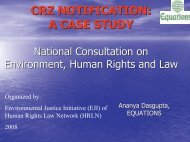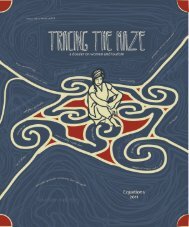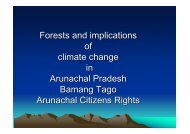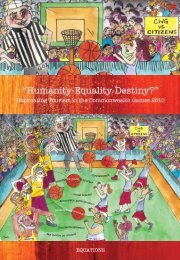Nilgiris Biosphere Reserve - Equitable Tourism Options
Nilgiris Biosphere Reserve - Equitable Tourism Options
Nilgiris Biosphere Reserve - Equitable Tourism Options
You also want an ePaper? Increase the reach of your titles
YUMPU automatically turns print PDFs into web optimized ePapers that Google loves.
The focal event of lYE was the World Ecotourism Summit (WES) held in<br />
Quebec, Canada, from 19 to 22 May 2002. It was co-hosted by WTO, the<br />
Canadian <strong>Tourism</strong> Commission and Quebec <strong>Tourism</strong>.<br />
The Commission on Sustainable Development (CSD) and other venues<br />
were advised to implement the lYE. Within the UN system the CSD's Interagency<br />
Committee on Sustainable Development (IACSD) mandated the<br />
World <strong>Tourism</strong> Organisation (WTOIOMT) and the United Nations<br />
Environment Programme to prepare and co-ordinate supportive activities<br />
for and during the year.<br />
The Quebec Declaration of the International Year of Ecotourism 2002<br />
stresses to achieve equitable social, economic and environmental benefits<br />
from ecotourism and other forms of tourism in natural areas, and to<br />
minimise or avoid potential negative impacts, participative planning<br />
mechanisms are needed that allow local and indigenous communities, in a<br />
transparent way, to define and regulate the use of their areas at the local<br />
level, including the right to opt out of tourism development.<br />
The International Year of Ecotourism 2002 acknowledge that tourism<br />
has significant and complex social, economic and environmental<br />
implications, which can bring both benefits and costs to the environment<br />
and local communities, and hence emphasise that ecotourism should<br />
continue to contribute to make the overall tourism industry more<br />
sustainable, by increasing economic and social benefits for host<br />
communities, actively contributing to the conservation of natural resources<br />
and the cultural integrity of host communities, and by increasing awareness<br />
of all travellers towards the conservation of natural and cultural heritage.<br />
VII.<br />
The UN's Draft Declaration on Rights of Indigenous<br />
Peoples<br />
In 1982, a Working Group on Indigenous Populations (WGIP) was<br />
established. In 1993, the WGIP completed its work on a "Draft Declaration<br />
on the Rights of Indigenous Peoples" to be adopted by the UN General<br />
Assembly. The Draft Declaration was the result of the work of<br />
representatives of indigenous peoples and governments from all parts of<br />
the world.<br />
The Draft Declaration deals with the rights of indigenous peoples in areas<br />
such as self-determination, culture and language, education, health,<br />
Nilagiris : FtUlillg Glory 58


